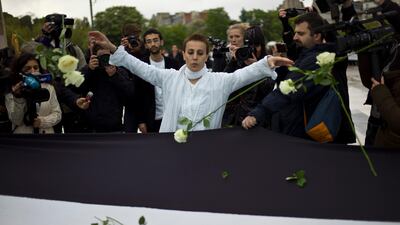We have a particular attachment to television stars who enter our homes and feel familiar, even though we may have an image of them that is far removed from reality. And when one of these stars passes away, there is a particular grief that is hard to articulate. We grieve for someone we have got to know, yet don't know at all; someone we had expected we would see again, without really knowing under what name or in what role. However, every now and then we get to know an actor outside the world of entertainment. A campaigning position or a personal crisis sometimes reveals more about the actor beyond the image we are accustomed to. In the Arab world, we have seen some stars rise only to be tied to a certain political movement or historical moment. This has been especially true in Syria. As protests turned into an uprising in 2011 and the Syrian government's clampdown led to a full-scale war, every aspect of Syrian society was torn apart, including the arts. Some actors emerged as staunch supporters of president Bashar Al Assad, while others went into exile as they raised their voices against his actions. None was more evocative than Fadwa Sulaiman, who became one of the most prominent symbols of the peaceful revolt against Mr Al Assad. Early in the uprising, Sulaiman appeared at protests, standing alongside other protesters calling for reforms and justice.
Last week, Sulaiman lost her battle with cancer. She was just 47 years old. With her death, many Syrians, as well as those who have known and loved Syria, mourned the death of the ideal she represented. She always took a principled position, setting aside fame, wealth or status.
Born in 1970, Sulaiman rose to prominence at a time when Syrian drama was at the peak of its popularity in the Arab world. And yet her most significant role came in 2011, when she chose to join the revolution in Homs against Mr Al Assad. The city was later subjected to one of the regime's most destructive air campaigns of an urban centre. Sulaiman left Syria in 2012 after she was accused of treason, which is punishable by death. She went to Paris, from where she continued her struggle to remind the world of the ideals that civic and community leaders wanted Syria to stand for. Sulaiman not only defended her country, but her own sect. Like Mr Al Assad, she was born to an Alawite family and insisted that the war in Syria was not driven by sectarianism and that not all Alawites approved of the regime’s actions.
The news of Sulaiman's death came only days after the confirmation of what many Syrian civil society activists had long feared – that Bassel Khartabil had been executed. Unlawfully detained since 2012, his family finally got confirmation that Bassel had been killed in prison in late 2015. The list of those who have died or remain missing is exhaustive. An open-source software developer, Khartabil was a well-known and much-loved figure in Syria's creative circles. He too joined the peaceful and civic movement in 2011.
___________________________
Read more:
Saudi Arabia sets about unifying opposition to Assad
___________________________
The deaths of Sulaiman, Khartabil and many others come at a time when the Syrian opposition is desperately trying to reclaim the narrative that there are only two options in Syria: Mr Al Assad’s regime or terrorists. That is what Mr Al Assad, his Russian ally Vladimir Putin and Iranian military men have been seeking over the past six years. That is a false dichotomy. There are those who continue the peaceful struggle on the ground in Syria and those who have been forced out. Others such as Razan Zaitouneh remain missing, but are not forgotten.
Some foreign diplomats try to excuse the failure to reach an end to the carnage in Syria by saying that there are no good sides in the country today. Those types of statements dishonour those who died and those who continue the struggle. The “good sides”, that is those who do not have blood on their hands, become the weakest in a struggle that is being determined by guns.
___________________________
Read more about Syria from Opinion
Editorial: The world must not give up on Syrians
___________________________
As she resigned from the UN commission investigating human rights abuses in Syria, war crimes prosecutor Carla del Ponte was quoted saying: "We are powerless, there is no justice for Syria". Her statement echoes the sentiment of millions of Syrians, as well as those who know and love and feel for Syria.
Sulaiman joins others such as Khaled Al Essa, who died outside their beloved motherland, but remained firmly attached to it until their last breath. While Fadwa died in exile in Paris, Al Essa, a journalist, risked his life to allow his country’s story to reach the world. He was injured in a government airstrike, and survived, only to get critically injured by an explosive device planted at his residence. He later died of his injuries in Turkey. Both were forced to leave Syria because of a senseless war waged by a regime that failed to hear the cries of the people in the early days of the uprising. Ignoring their presence and the peaceful nature of the start of the uprising does a further injustice to Sulaiman and millions more.
___________________________
Also read:
Syria’s refugees are losing hope of going home. They may be right
We need to resolve humanitarian crises in innovative ways
___________________________
Follow The National’s Opinion section on Twitter
This article was amended to clarify the cause of death of Mr Al Essa

